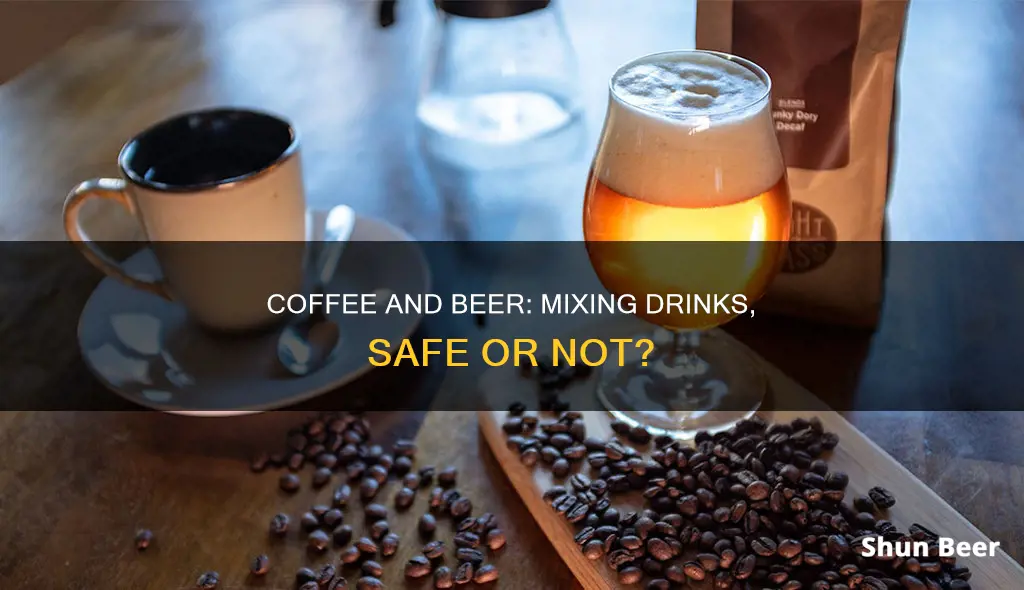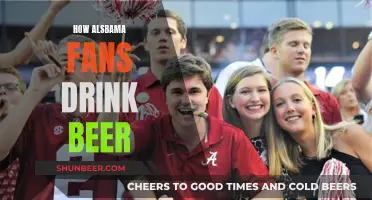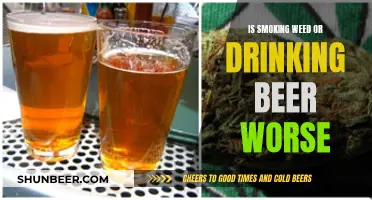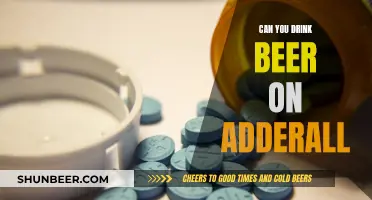
Drinking beer after coffee may not be the best idea. While it may be tempting to mix caffeine and alcohol, the effects it has on your body can be harmful. Both substances are diuretics, which means you will need to urinate more and can lead to dehydration. Caffeine is a stimulant that can make you feel more alert and energetic, while alcohol is a depressant that can make you feel sleepy. When mixed, the caffeine can mask the effects of the alcohol, making you feel more alert than you normally would while drinking. This can lead to drinking more than usual, increasing the risk of drunk driving, alcohol poisoning, or injury.
| Characteristics | Values |
|---|---|
| Recommended | No |
| Safe | No |
| Effects | Caffeine masks the effects of alcohol, making you feel more alert and capable than you are. |
| Caffeine does not reduce blood alcohol level or the way your body clears alcohol from your system. | |
| Increased risk of drinking more than usual, driving while intoxicated, alcohol poisoning, injury, binge drinking, and irregular heartbeat. | |
| Raises blood pressure, increasing the risk of stroke, heart attacks, and irregular heartbeats. | |
| Affects sleep patterns. | |
| Dehydration | Alcohol and caffeine are diuretics, causing you to urinate more. |
What You'll Learn

Mixing beer and coffee can lead to binge drinking
Firstly, caffeine and alcohol have opposing effects on the body. Caffeine is a stimulant, which increases activity in the brain, making you feel more alert and energetic. On the other hand, alcohol is a depressant, slowing down brain activity and causing loss of motor control and lack of concentration. When combined, these two substances can counteract each other, leading to a "perfect storm" of side effects.
One of the key dangers of mixing beer and coffee is that caffeine can mask the effects of alcohol. You may feel more alert and less drunk than you actually are, which can be dangerous. This false sense of sobriety can lead to drinking more alcohol than usual, increasing the risk of alcohol poisoning, accidents, injuries, and alcohol-induced injuries. This is especially true for caffeinated alcoholic beverages (CABs), which often have a higher alcohol content than regular beer.
Research has shown that individuals who mix alcohol with high-caffeine energy drinks have a much higher chance of binge drinking. Binge drinking is defined as consuming about four or five drinks in a two-hour period. One study found that students who regularly consumed energy drinks were more than twice as likely to have alcohol-related incidents, such as riding with a drunk driver or becoming injured. Another study linked the mixing of alcohol and caffeine to an increased risk of injury and a higher likelihood of binge drinking.
Mixing beer and coffee can also affect your heart and sleep patterns. Both substances can increase your blood pressure, raising the risk of cardiovascular conditions such as heart disease, heart attacks, and irregular heartbeats. Additionally, caffeine blocks sleep-inducing receptors in the brain, disrupting your sleep and leaving you feeling fatigued.
Overall, it is best to avoid mixing beer and coffee to prevent the potential negative consequences on your health and safety.
Drinking and Driving: DUI Risks After One Beer
You may want to see also

It can cause an irregular heartbeat
Drinking beer after coffee may not be the best idea, as both substances can have adverse effects on the body when mixed. While the combination of the two is unlikely to cause an irregular heartbeat, they can still negatively impact heart health.
Firstly, it is important to note that caffeine and alcohol are two very different substances. Caffeine is a stimulant, while alcohol is a depressant. This means that they have opposite effects on the body. Caffeine increases activity in the brain, making you feel more energetic and alert. On the other hand, alcohol slows down brain activity, leading to loss of motor control, lack of concentration, and drowsiness.
When mixed, these two substances can counteract each other and cause what researchers call "the perfect storm" of problematic side effects. One of the main concerns is that caffeine can mask the effects of alcohol. You might feel more alert and energetic than you normally would, but this does not mean that you are less drunk. In fact, your blood alcohol level will continue to rise as you drink, even though you may not feel the effects. This increases the risk of drinking too much, which can lead to alcohol poisoning, accidents, or alcohol-induced injuries.
In addition, mixing caffeine and alcohol can lead to other issues such as an increased likelihood of binge drinking, risky behaviours, and a higher chance of sexual assault. It can also disrupt sleep, cause digestive issues, and increase blood pressure, which can be problematic for people with existing cardiovascular issues or an irregular heartbeat.
While drinking beer after coffee may not directly cause an irregular heartbeat, it is still advisable to avoid this combination due to the potential negative consequences on overall health and well-being. It is always important to consume caffeine and alcohol in moderation and be mindful of their potential effects on the body.
Minors and Non-Alcoholic Beer: Is It Safe?
You may want to see also

It can increase the risk of alcohol poisoning
Drinking beer after coffee can increase the risk of alcohol poisoning. Caffeine is a stimulant, while alcohol is a depressant. When mixed, caffeine can mask the effects of alcohol, making you feel more alert and energetic than you usually would while drinking. This can lead to drinking more alcohol than usual, increasing the risk of alcohol poisoning.
Alcohol poisoning occurs when there is so much alcohol in the bloodstream that it starts affecting vital functions such as breathing, heart rate, and consciousness. It can be life-threatening and requires immediate medical attention. Caffeine does not reduce the amount of alcohol in the system or help sober a person up. When caffeine masks the effects of alcohol, individuals may mistakenly believe they can handle more alcohol, leading to dangerous levels of consumption.
The masking effect of caffeine on alcohol can impair judgment and increase the likelihood of binge drinking, especially among young adults and college students. Binge drinking significantly increases the risk of alcohol poisoning. Additionally, consuming caffeine with alcohol can lead to dehydration, further exacerbating the negative effects of alcohol on the body.
Furthermore, drinking coffee when experiencing a hangover could make an individual feel more alert but may also prolong or worsen hangover symptoms due to its dehydrating effects. Caffeine can stay in the system for up to six to ten hours, continuing to influence the side effects of alcohol even hours after consumption.
Overall, mixing beer and coffee can increase the risk of alcohol poisoning by masking the effects of alcohol, leading to excessive drinking and dehydration. It is essential to be aware of this risk and consume alcohol and caffeine responsibly and in moderation.
Drinking Beer and Driving in the UK: What's Allowed?
You may want to see also

It can lead to heightened anxiety
Drinking beer after coffee can lead to heightened anxiety. Caffeine and alcohol are opposites, with caffeine being a stimulant and alcohol being a depressant. When consumed together, they can counteract each other and cause problematic side effects.
Caffeine can mask the effects of alcohol, making you feel more alert and capable than you are. This can lead to drinking more alcohol than intended, increasing the risk of alcohol poisoning and other dangers such as driving while intoxicated or injury. Additionally, caffeine can increase the heart rate, excitability, or anxiety, especially in those predisposed to anxiety disorders.
People with underlying anxiety disorders may find that drinking coffee worsens their anxiety symptoms. Caffeine can trigger a spiral of sensations, such as sweaty palms, a pounding heart, and ringing in the ears, which can lead to a full-blown panic attack. Caffeine blocks the depressant function of a chemical called adenosine, which can result in a pleasurable sense of energy and focus for some but jitters and anxiety for others.
The American Psychiatric Association has recognized the link between caffeine and anxiety by adding caffeine intoxication, caffeine-related anxiety, and caffeine-related sleep disorders to its list of official diagnoses. Research also suggests that adenosine receptor genes play a role in the development of anxiety, indicating that caffeine may make certain individuals more susceptible to anxiety disorders.
Ginger Beer: A Standalone Beverage?
You may want to see also

It can disrupt your sleep pattern
Drinking coffee after beer can disrupt your sleep pattern. Caffeine and alcohol are central nervous system stimulants and depressants, respectively. While caffeine makes you feel more alert, alcohol slows down your brain activity and makes you drowsy. When consumed together, they counteract each other and cause problematic side effects.
Caffeine can mask the effects of alcohol, making you feel more alert than you actually are. This can lead to binge drinking and an increased risk of alcohol poisoning. Drinking coffee after beer can disrupt your sleep pattern by making you feel less drunk than you are. This can cause you to drink more alcohol, leading to a higher risk of alcohol poisoning.
Caffeine disrupts sleep by blocking sleep-inducing receptors in your brain and interfering with your body's circadian rhythm. It can make it difficult to fall asleep and reduce the quality of your sleep, leaving you feeling fatigued. Drinking coffee after beer can disrupt your sleep pattern by interfering with your sleep cycle and reducing your total sleep time.
Additionally, long-term alcohol use can result in chronic sleep problems and disorders like sleep apnea. Alcohol can also interfere with your circadian rhythm, making it harder to fall asleep and wake up at the desired times. Drinking coffee after beer can disrupt your sleep pattern by altering your natural sleep cycle and making it difficult to get a good night's rest.
To avoid these negative effects, it is recommended to avoid consuming caffeine and alcohol together or close to bedtime. Spacing out your drinks and planning ahead can help minimize the risks associated with mixing these two substances.
Non-Alcoholic Beer: Under 21s and Their Drinking Options
You may want to see also
Frequently asked questions
Mixing alcohol and caffeine is not recommended, as it can lead to a range of negative health effects, including heightened anxiety, binge drinking, and an increased risk of injury and alcohol poisoning.
Caffeine is a stimulant, while alcohol is a depressant. When combined, the stimulant effects of caffeine can mask the effects of alcohol, making you feel more alert and energetic than you normally would while drinking. This can lead to drinking more alcohol than usual, increasing the risk of alcohol poisoning.
Mixing caffeine and alcohol can cause an increased risk of binge drinking, especially among younger adults. It can also lead to dehydration, sleep disruptions, and an irregular heartbeat. Additionally, caffeine and alcohol can affect your heart and brain chemicals that regulate sleep.
While there may be an initial energy boost from the combination of caffeine and alcohol, the long-term effects are detrimental and can lead to serious health complications. It is best to avoid mixing these two substances.







